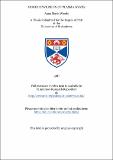Mode conversion of plasma waves
Abstract
Linear mode conversion processes are much studied in plasma physics because they determine the efficiency of any radio frequency heating scheme. Mode coupling model equations, extracted with varying degrees of rigour from the Maxwell-linearized kinetic equations, are usually fourth or higher order O.D.E's. These are solved by complicated methods to obtain transmission, conversion, reflection and absorption coefficients. Recently, Fuchs et al and Cairns and Lashmore-Davies (C.L-D.) have postulated second order O.D.E's to describe pairwise coupling events. The second order theories have reproduced results previously obtained by much more sophisticated treatments. In this thesis, we firstly examine the hybrid resonances in a cold plasma and show that they have a mode conversion interpretation in the framework of the C.L-D. model. The Budden tunnelling coefficients are recovered for this case. Next, mode conversion between the fast and slow electromagnetic waves in the lower hybrid frequency range is considered. This phenomenon determines the accessibility of the lower hybrid resonance to the slow wave, and is also of theoretical interest because the mode coupling differs in certain aspects from cases previously investigated by C.L-D. A second order approximation to the dispersion relation is used in the mode conversion region leading to Weber's equation from which transmission coefficients are then obtained in various cases. Finally, we provide justification for the use of Weber's equation. The exact fourth order system of O.D.E's for the problem is set down, and a linear transformation, which is an extension of that given by Heading, reveals the second order nature of the coupling process. Numerical solutions of the fourth order system yield transmission coefficients in excellent agreement with the second order theory, and also demonstrate that the electric field variation across the mode conversion region is well approximated, via the above transformation, by our second order theory.
Type
Thesis, PhD Doctor of Philosophy
Collections
Items in the St Andrews Research Repository are protected by copyright, with all rights reserved, unless otherwise indicated.

